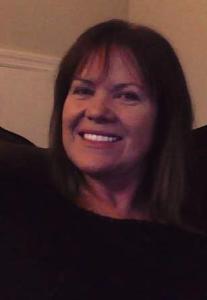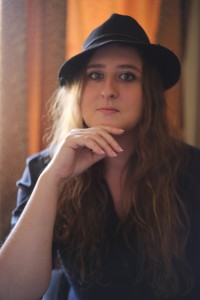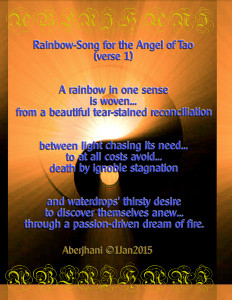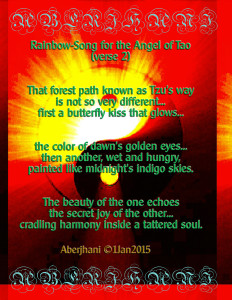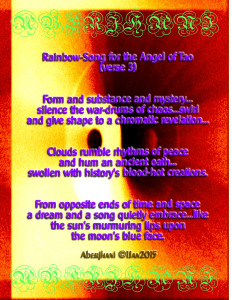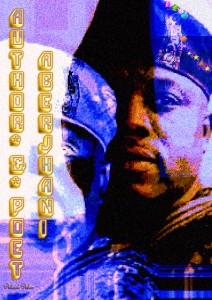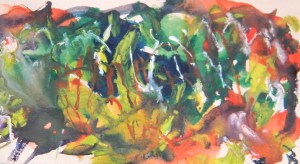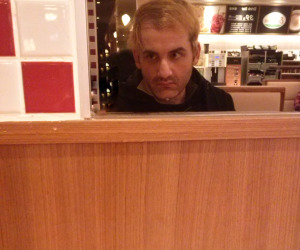
POETRY LIFE AND TIMES AN INTERVIEW WITH AUTHOR-POET ABERJHANI
by Sara L Russell and Robin Ouzman Hislop for Poetry Lifetimes & Poetry Life & Times
Biography:
The American-born author Aberjhani is a widely-published historian, poet, essayist, fiction writer, journalist, and editor. He is a member of PEN International’s PEN American Center and the Academy of American Poets as well as the founder of Creative Thinkers International. He launched the 100th Anniversary of the Harlem Renaissance Initiative in 2011 and during the same period introduced netizens to concept of guerrilla decontextualization via a series of essays and website of the same name.
He has authored a dozen books in diverse genres and edited (or sometimes co-edited) the same number. His published works include the Choice Academic Title Award-winning Encyclopedia of the Harlem Renaissance, the social media-inspired Journey through the Power of the Rainbow: Quotations from a Life Made Out of Poetry, the modern classic ELEMENTAL The Power of Illuminated Love (a collection of ekphrastic verse featuring art by Luther E. Vann), and the frequently-quoted poetry collection, The River of Winged Dreams.
Among his works as an editor are the Savannah Literary Journal (1994-2001), plus the Civil War Savannah Book Series titles: “Savannah: Immortal City” (2011), and “Savannah: Brokers, Bankers, and Bay Lane-Inside the Slave Trade” (2012). In 2014, Aberjhani was among a limited number of authors invited to publish blogs on LinkedIn. You can learn more about the author at Creative Thinkers International, on Facebook, Twitter, or his personal author website at http://www.author-poet-aberjhani.info/
The Interview
Sara: Firstly Aberjhani, what first inspired you to write poetry?
Aberjhani: What first inspired me to write poetry as a teenager were the power and the magic that I experienced through the works of the poets of the Harlem Renaissance, the Beats, and the Black Arts Movement. As I read and understood them, their voices dared to challenge power and rearrange worlds. I needed to discover that possibility because my own world was one ruled by poverty and racism, and it was very much in need of rearranging. Or remaking. But I have to say also that the notebooks of Albert Camus, the diaries of Anais Nin, and the essays of James Baldwin inspired me to write poetry as well because poetry was what I usually heard when I read their prose.
Sara: You have in the past stated that your network Creative Thinkers International is a reaction against what happened on 9/11; to embrace the world with positive creativity. Your poem “The History Lesson” (from “ELEMENTAL, The Power of Illuminated Love”) seems to bear this out. It speaks eloquently of unshakeable faith in times of conflict. I would like to know more about the ELEMENTAL book and some of the particular world events that inspired you to write it.
Aberjhani: ELEMENTAL is collection of ekphrastic poetry and essays based on the painted metaphysical meditations of Luther E. Vann and my own creative spiritual journey. It’s unique within the body of my works for that reason but also because Luther and I are connected to the Harlem Renaissance in some unique ways. He was taught by artists of the Harlem Renaissance and I had the honor of co-authoring the first Encyclopedia of the Harlem Renaissance. At this point he is one of America’s foremost visual artists so it is a true honor to co-create a book like this with him.
ELEMENTAL was written from 1991- 2008. That stretch of 17 years was filled with many powerful life-changing and world-traumatizing events. You mentioned the poem “The History Lesson.” In it, the late Michael Jackson is referred to as “a feather-throated songboy” who “screamed madness from atop his platinum-plated cross.” This was the decade of Bosnian genocide, race riots in Los Angeles after the beating of Rodney King, the bombing of the World Trade Center in New York the first time around, and when India and Pakistan decided they needed nuclear bombs in their diplomatic pockets like everybody else. But it was also the decade that Nelson Mandela was finally freed––after what, 27 years?–– to later become South Africa’s first black president, and when the internet started taking off like crazy. Those events and subsequent game-changing headlines like 9/11, for us, put the significance of art and poetry to the test in a big way. What was its relevance then and what is it now? We hoped and hope that ELEMENTAL demonstrates creative alternatives, which is why the subtitle is The Power of Illuminated Love. Love in the form of painted beauty, sculpted language, dreamed wisdom, chromatic prayers, and tear-varnished stanzas. The pages don’t deny the existence of brutality and chaos in the world but they don’t dilute the real potential of commanding grace in our lives either.
Sara: In your poem “Angel of Healing: for the Living, the Dying, and the Praying” the second stanza has four lines which are twice as long as stanzas 1 and 3. It occurred to me that this might be to represent the shape of outstretched wings. Am I right?
Aberjhani: They certainly look that way when you place the entire poem on a single page and view it horizontally. I often felt like I was taking dictation when writing the poems in the Songs of the Angelic Gaze series and Angel of Healing originally consisted of two sets of four haiku-influenced units that arrived over the course of a week. I thought it was complete when the attendant angel of those particular syllables insisted on adding the middle four lines of aphorisms, which some refer to as proverbs. Every time I took them out to make the poem more consistent they would come back. Consequently, along with that addition came the visual effect you’re describing. I’ve always taken it as an indication, or maybe an affirmation, that as painful as life can be at times for people all over the world there is some component of existence, or nonexistence perhaps, operating to implement a balance and give us an opportunity to turn the horrors we’ve forced upon each other into something more conducive to sustaining at least minimal degrees of sanity and love.
Sara: I really enjoyed reading “A Poet’s Birthday Dance Through Fire and Rain”. Gramdma Elsie appears very vividly in my mind’s eye from the way you describe her and her “gin-and-coffee” voice. I would like to know more about her; since she has some influence in your life and your writing.
Aberjhani: I don’t mean to sound evasive at all but the best way for me to respond to that is probably with this poem about her from The River of Winged Dreams:
Photographed Light of My Grandmother’s Soul
The black and white photo shows you seated
in a wooden chair on the porch of a cabin
built likely by slaves, later inhabited by you:
Black American Woman Elsie Mary Bell Griffin.
One side of the image is shadowed
like the memories, the love, and perseverance
that shape your face into a hymn of quiet dignity.
The planks of the cabin’s wall are straight.
Like the rows of crops you used to hoe.
The window a rectangle of inked mysteries.
From a western corner of the late summer sky
light streams brilliant wonder into the picture,
rushing through leaves to kiss your head and arms.
Thus your eternal spirit confirms your weary blue bones.
Nowhere in the photo do we see the chopped-off heads
of snakes you later fed to the hogs. Their writhing corpses
would help explain the heavy boots that shelter your feet.
The news this year is a black man in the white house.
Perhaps when alive you shook his hand in a prophetic dream…
Your tears bled yesterday sealed the victory claimed today.
The light somehow is like a gentle jealous god
come to claim you solely for its own. The strength
of your calm gives you the power to surrender everything.
Bright rapture flows and you whisper, “Blessed be my Lord.”
Radiance splits your heart and your soul explodes three new stars.
Death rattles the tin roof and you command, “Peace, be still.”
© by Aberjhani
Sara: What is the main concept, or inspiration, behind your book “The River of Winged Dreams”?
Aberjhani: The River of Winged Dreams is about the journeys we undertake and the metamorphoses we experience when shifting back and forth between sacred impulses and profane indulgences as individuals and as a species. Instead of sacred and profane some might prefer the terms higher self and lower self, or enlightened mind and shadow mind. Most of us know that we can be better than what we are and do better than what we do, and a lot of us live in ways that oblige us to at least periodically make an effort. But the work required to move up from point C to point A, or to survive the drop from A down to C and begin all over again is rarely easy. So The River of Winged Dreams is about the mercies, hells, and revelations encountered in the midst of engaged passionate struggle sometimes relieved by moments of ecstatic tranquility. These might be the kind of poems and stories Sisyphus would tell himself while rolling his boulder up and down the hill of his determined resolve.
In a more concrete sense, the book is divided between very earth-bound poems like the one just shared, “Photographed Light of My Grandmother’s Soul,” and the Songs of the Angelic Gaze series that I mentioned earlier. The original series was written during what I call the Summer of the Angels following my mother’s death in 2006. I believe it’s in the gift edition of the book that my summer of the angels is humbly compared to Rainer Maria Rilke’s time in the Duino Castle (which was someplace between Italy and Austria) where he began writing his classic Duino Elegies during the winter of 1912-1913. Some might describe experiences of that kind as wrestling with angels of poetry and for me it very often felt that way. Once all the dust and feathers settled I found myself holding this somewhat unusual book.
Sara: Your poem / video “And Then The Rain God Screamed for Love” gets a lot of views on Poetry Life & Times, and is one of my favourite poems of yours. The collaboration with Nordette Adams works very well; her voice brings out the rich sensuality of the poem. Would you like to do more such collaborations in video / audio poems?
Aberjhani: Thank you, I didn’t know it had become that popular. “And Then the Rain God Screamed for Love” is from the book Visions of a Skylark Dressed in Black. It was a favorite performance piece when I did open mic readings some years back in downtown Savannah, Georgia. Nordette Adams and I both recorded spoken-word versions of it for the Goddess and the Skylark: Dancing through the Word Labyrinth CD produced by our fellow AuthorsDen alumnus Mark Rockeymoore in 2006. Hard to believe it’s been that long but it has. The video was a product of Nordette’s independent creative genius. She also took it upon herself to turn my recording of “An Angel for New Orleans,” which is another track from the CD, into a gift video for the city on the ninth anniversary of hurricanes Katrina and Rita.
At some point I do hope to record again and make videos, or hopefully write a full-length movie for that matter, but my primary focus right now is on completing some research and a couple of book projects. However, having said all of that, I should point out that the Goddess and the Skylark CD never did receive the kind of distribution or polished re-mastering that we intended so it is currently not available. I invite anyone with the professional know-how and resources for working with the files and helping us put a new edition out there to contact one of us. Since next year marks the 10th anniversary of the CD it would be nice to introduce it to a new audience.
Sara: Robin Ouzman has two questions to ask you…
Aberjhani: Hey Robin.
Robin: What do you think of the correct use of forms in Poetics & individual innovations from those forms that no longer correspond to their various criterion (& therefore arguably are not acceptable)?
Aberjhani: There have always been those poets who adhere to what is recognized as formal mathematical-based syllable counts, scansion, and classic themes, but at the same time innovators have made important contributions to poetry with their own reinventions and evolution of the craft. Poet John Ashbery once said he wasn’t sure that what he had written in his book Self-Portrait in a Convex Mirror was poetry but then he won not one or two major awards for it but three– the Pulitzer Prize, the National Book Award, and the National Book Critics Circle Award.
Walt Whitman’s self-styled cadences and certainly the poems of E.E. Cummings map out their own literary territory and establish their own laws of poetics, yet their impact continues to endure and inspire. I believe the key for giving effective meaning to the distinction you make Robin lies within the individual poet’s relationship with language. Poets who endeavor to actually develop one–through reading, writing, listening, dreaming, crying a lot and laughing a little more—can break rules with some boldness while still conveying significance with clarity. And yet, going back to Ashbery, W.H. Auden selected his first book for the Yale Younger Series of Poets Award and then said later he didn’t have a clue what it was about. Above all else there has to be, I think, a sincere confession of individual intent to honor a purpose worthy of the deeper passion, beauty, and spiritual intensity which so many associate with poetry.
Robin: Have you ever or do you ever experience “Writer’s Block”; I mean in Poetics especially. Let me extend on that percept, do you find it easier or more difficult to write with age and do you think that Poetry improves with age in the Writer/Poet or that it somehow, I mean in Poetics, loses its initial flair?
Aberjhani: As a military journalist in my previous professional lifetime I was trained to produce stories whether I felt inspired or not. That initial training later combined with inspiration from my spiritual explorations to create a tendency to think in patterns like literary templates for stories as well as Poetics and other genres. I sometimes dream certain poems that I never write down because I believe they belong where they found me. I have also spoken poems over waves rolling in off the ocean and then watched their translucent lines float off without writing or recording them either.
Some form of creative composition is always taking place on some level of my consciousness so I cannot say that I have ever known what it means to have writer’s block. Having enough money in the bank to take the time to write as much as I would like is another matter altogether.
So far as what poets possibly gain from age is concerned, I would hope that it is a more refined informed perspective combined with a flexible use of form and a gentle radiant certainty about how and why poetry has become a permanent component, if not the definitive core, of what you come to know as your truest Self. Rumi spoke in poems right up until his physical death. What that means to me is that he won the ultimate prize bestowed by poetry, which I believe is the ability to consciously live one’s soul while still in the world. When that happens, the flair of poetics and poetry grows increasingly brighter throughout your life. The forms might alternate but the meanings grow deeper and the certainty, whether or not everyone agrees with it, maybe shines a little more brilliantly.
Sara: Are you working on any new books or multimedia projects at the moment?
Aberjhani: Being the literary workaholic that I have been most of my adult life, I’m currently working on two nonfiction books, a volume of continuous narrative poems, a play, and a magazine project. The nonfiction books are The Boy with the Guerrilla Decontextualized Face, for which there is a corresponding website (http://www.guerrilla-decontextualization.net/ ), and Greeting Flannery O’Connor at the Back Door of My Mind, which is on the history and culture of my hometown of Savannah, Georgia. Two poems from the forthcoming collection were recently published in Black Gold: an Anthology of Black Poetry edited by Ja A. Jahannes. The play has been a work in progress for a couple of years and that’s probably the most I should say about it for the time being. I’m also working on a follow-up to my last book, Journey through the Power of the Rainbow with an illustrated edition called Tao of the Rainbow (http://the-journey-and-the-rainbow.weebly.com/blog-tao-of-the-rainbow ).
The magazine project is really the brainchild of light photographer Aurora Crowley. He’s working with the online Glassbook magazine to produce an art and poetry feature that combines my words with his light photography. I’ve seen some of the extraordinary things he can do with his subjects so I’m looking forward to seeing how the project develops.
Sara: Finally Aberjhani, what are your future plans for Creative Thinkers International?
Aberjhani: That is such a good question. When CTI was founded in 2007, above all else it was to affirm that members of the global community could somehow heal the extreme divisiveness caused by the intense fear, anger, distrust, and despair that followed 9/11. I hoped that those who joined could help show that exchanges of gunfire and bombs were not our only alternatives from that point on. We had not lost the totality of our humanity to a nightmare that came crashing out of the sky. The need to strengthen and sustain cross-cultural exchanges based on cooperation and expanded awareness of each other’s values and needs is still very real. The abduction of school children in Nigeria and the “Je Suis Charlie” massacre in Paris, plus the current racial tension in the United States, are just a few heartbreaking examples of that fact. We can see that almost every day from the failure of terrorists and diplomats to resolve conflicts in more humane nonviolent ways.
I believe CTI still plays a small role in fostering the will and ability to communicate past the blinding rage because we often share far more common ground in our cultural connections than we do in our political disconnections. I began partnering last year with Karen Armstrong’s Charter for Compassion organization, which was founded in 2008, in large part because it has many of the same goals as Creative Thinkers International.
My preference is to see the community continue to grow and evolve, which we have in fact been doing over the past year despite the inevitable technological glitches that come with upgrades. If, however, we reach a point where it becomes apparent that CTI has contributed all it can to our stated mission, and we need to leave whatever remains to be done up to everybody else, then we will close shop and invest our creative energies in other mindful pursuits. But for now we’re still doing what we can to help make a positive creative difference in a world that keeps getting hammered with negative actions and consequences.
Sara: Thank you very much for the interview, Aberjhani.
Aberjhani: Thank you Sara. From one 21st century creative artist to another, it’s been a pleasure and an honor.
Angel of Healing: for the Living, the Dying, and the Praying
1.
As you bury flesh––
honor spirit, savor hope,
cherish memory.
Consider heaven
as a world-weary stranger asleep
in your heart.
Quote words that affirm
all men and women
are your brothers and sisters.
Pull the child away
from feeding at the mule’s tail.
Give the baby food.
2.
Compassion crowns the soul with its truest victory.
Hearts rebuilt from hope resurrect dreams killed by hate.
Souls reconstructed with faith transform agony into peace.
Wisdom applied internally corrects ignorance lived externally.
3.
Dare to love yourself
as if you were a rainbow
with gold at both ends.
Write a soft poem
to one you called bitch, shit head,
nigger, fag, white trash.
Live certain days dressed
in your lover’s smiling soul
while she, he, wears yours.
Imagine your mind
wings intent on expanding
and watch your joy fly.
© Aberjhani (from The River of Winged Dreams)
____________________________________
A Poet’s Birthday Dance through Fire and Rain
Lighting her pipe and puffing her years,
Grandma Elsie said, “When I was a girl
God showed me my whole life. Scared me.
Didn’t know what I was seein’ ‘til
all that time filled up like a fat man’s belly.
Now I know. Breaks my heart. Makes me so happy.”
Her gin-and-coffee voice wraps around me
like a cashmere scarf of spring and autumn.
I recall four innocent eggs from a pigeon’s nest
crashing at my guilty feet. Grandma was that
God revealing the fate of the two sons
and twin daughters I would never know?
Childhood was a slippery diving board
on which often my heart cracked, bouncing,
splashing, into piranha-hosted orgies.
Thrill of being noticed so intoxicating
that I didn’t mind being eaten alive.
The more my life bled, the louder it laughed.
At night words sneaked into my bed––
triple-sexed pronouns slurped my virginity.
My gypsy dreams spurted liquid ballads and
perfumed sonnets. A lexicon of hunger stained
fevered sheets with sticky genius and marijuana tears.
In daylight I tended carefully my garden of
darkness singing secret terrors to the earth.
Thus did language authorize my fear
to dismiss itself––and knowledge empower
my body to act with passionate wisdom.
Out of muddy turds flew freedomsongs of mystic blue.
Slouching towards manhood I dragged with me
a world as well as my dick but mostly––
a heart addicted to the scent of dreams,
arms libertarian in their will to embrace,
a soul eager to bear the sins of Love,
a mind unafraid to waltz naked in fire or rain.
© Aberjhani (from The River of Winged Dreams)
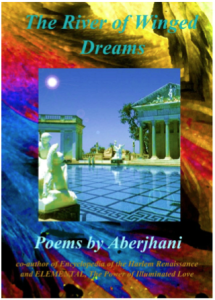
The History Lesson
This morning bombs ruined
the back yard. Prophecies and
rumors of prophecies all came true.
A despot bound for hell
took the long way to a very bad day.
A feather-throated songboy screamed
madness from atop his platinum-plated cross.
But the temple of your presence?
It never shook once.
Biblical atrocities stormed chaos
from New York to Bagdad to Freetown.
The sun and moon of your face refused
to hide behind Armageddon.
Wisdom gushed like diamonds from your brow:
“Knowledge planted in truth grows in truth.
Strength born of peace loses nothing to hate.”
How many fears came between us?
Earthquakes, diseases, wars where hell
rained smoldering pus
from skies made of winged death.
Horror tore this world asunder.
While inside the bleeding smoke
and beyond the shredded weeping flesh
we memorized tales of infinite good.
© Aberjhani (from ELEMENTAL, The Power of Illuminated Love)
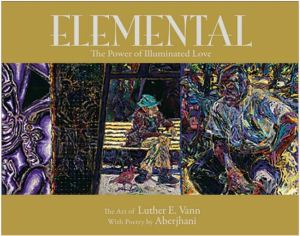
robin@artvilla.com
PoetryLifeTimes
Poetry Life & Times
editor@artvilla.com
www.artvilla.com
Artvilla.com
